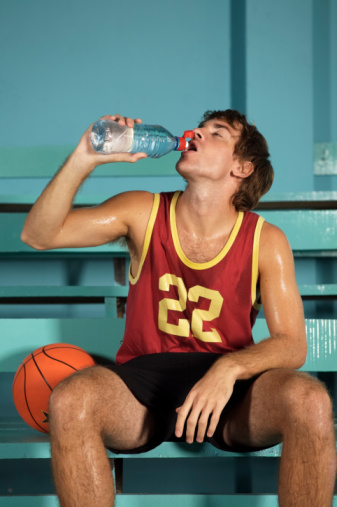When you are watching your favorite sports team on TV, have you ever
noticed that the first thing the athletes do when they get to the
sideline or dugout is get a drink? Whether on their own or from the
hand of an athletic trainer, they drink constantly every chance they get
throughout the game. That is how important hydration is to athletic
performance.

So it is a true mystery to me that proper hydration isn't weaved in the fabric of our youth sports culture. In fact, proper hydration is just as important to safety as any protective equipment. If our young athletes had better access to the right fluids in the right way, their sports performance would not only dramatically improve but the risk of one of the most dangerous sports injuries, dehydration and heat illness, would be dramatically reduced.
Thirsty? Think Salt!
You've heard the old saying that the human body needs 8 glasses of water a day to stay healthy. Did you know that was a myth? In fact, it is one of the biggest pop medical myths of our time. No one is quite sure where it came from and no scientist to date has been able to prove that 8 is the number. What we do know is that our bodies need fluids to function, water being one of them, and an important one since 80% of our body is comprised of water. However, to be "water balanced" we need salts (electrolytes), too, especially sodium and potassium, and some sugar, namely glucose.
Typically, we lose water and salt together in tears, sweat, urine and stool. As we go about a typical day with a normal diet that water and salt gets replaced just fine. But sometimes, in special situations, we can lose a bit more of water or salt such as with fever or gastrointestinal illnesses and we need more fluids than we typically need. Sports and warm weather are the two other special circumstances that put people at very high risk for becoming dehydrated and the people at most risk are kids. This is when we need to worry about becoming dehydrated and where rehydration with fluids, including sports drinks, play an important role.
The only other way to replace fluids when dehydrated is by an intravenous line and sometimes that is needed. However, with proper hydration before, during and after a sports workout or game, a child can be spared this simple yet often unsettling procedure.
Many parents don't know that sports drinks are designed as rehydration fluids, not for general use, so they end up not giving them to their children out of fear of all the "extra calories" they supposedly contain. It is true that extra calories might be an issue (and, for some kids, is an issue) if you gave sports drinks to your kids to drink during the day as regular hydration. But used for their intended purpose - to re-hydrate and replaced energy stores used during exercise - the extra sugar in a sports drink simply replaces the sugar your child uses up during exercise.








